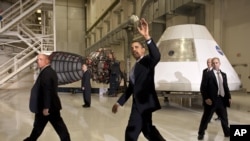President Barack Obama on Thursday set out his plan for the future of the U.S. space agency NASA. His vision includes an eventual manned flight to Mars, although not as soon as many Americans had hoped. The president went to Florida's Kennedy Space Center to defend his controversial proposal to change America's course in space.
President Obama says he wants American space exploration to "leap into the future," and not continue on the same path. "By the mid-2030s, I believe we can send humans to orbit Mars and return them safely to earth, and a landing on Mars will follow, and I expect to be around to see it," he said.
At the Kennedy Space Center, where U.S. space missions begin, Mr. Obama unveiled his proposal for the future of NASA beyond the end of the space shuttle program, which has only three flights remaining.
The president's plan would give private companies almost $6 billion to build their own spacecraft and fly them to the International Space Station. It would also extend the station's life by five years.
Billions of dollars more would be put into research for developing new NASA rockets for space missions that eventually would lead to a manned mission to Mars. The plan replaces former President George W. Bush's Constellation program that would have taken astronauts back to the Moon and then to the Red Planet.
Mr. Obama says his approach will for allow more and better space exploration. "We will actually reach space faster and more often under this new plan, in ways that will help us improve our technological capacity and lower our costs, which are essential for the long-term sustainability of space flight," he said.
The president has been sharply criticized by some lawmakers and former astronauts for canceling plans to return to the Moon.
In the House of Representatives, Republican Congressman Rob Bishop says scrapping lunar missions will hurt U.S. defense. "Rockets that are built to send a guy to the Moon are built by the same kinds of people who build the rockets to stop a North Korean or Iranian or some other rogue missile from coming into this country," he said.
The first man to walk on the Moon, Neil Armstrong, and other former Apollo program astronauts Jim Lovell and Eugene Cernan, are also criticizing Mr. Obama's decision. In a letter to the media, the three write that "America must decide if it wishes to remain a leader in space."
Armstrong's Apollo 11 crewmate, Buzz Aldrin, supports Mr. Obama's decision. He traveled with the president on Air Force One to Thursday's appearance at Cape Canaveral.
Mr. Obama said he is 100 percent committed to NASA's mission and future, and that he wants U.S. space exploration to reach beyond the Moon. "We have been there before. Buzz has been there. There is a lot more of space to explore and a lot more to learn when we do," he said.
Mr. Obama was the first sitting president in 12 years to visit the Kennedy Space Center. He said space exploration is not a luxury, but a necessity for America.




